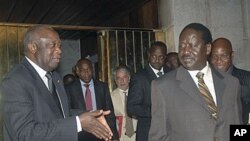A special adviser to embattled Ivorian President Laurent Gbagbo said the United Nations has once again demonstrated that it is unable to resolve the ongoing crisis in Ivory Coast following the disputed 28th November presidential run-off vote.
Ambassador Yao Gnamien, who is currently in Europe to lobby for support of Mr. Gbagbo’s administration, will continue to seek a face-to-face dialogue with his rival, President-Elect Alassane Ouattara, to resolve the ongoing crisis.
“Since the year 2002, I think that the United Nations has proved that they cannot help the Ivorians reach the peace they need in our country. So, it is a situation that can lead to another controversy between the people of Cote d’Ivoire and the so-called international community,” said Gnamien.
“We think that the decision of the U.N. Security Council is not new, (because) it’s in the same line like what they did in the year 2002 when they allowed these rebels to come and attack the government of Cote d’Ivoire. I think that we cannot change our attitude. We will negotiate and then we will find a solution to our crisis.”
The U.N. Security Council unanimously agreed to send 2,000 additional peacekeepers to Ivory Coast. Ambassador Gnamien said the world body erred by approving the additional troops.
“We believe that the power belongs to the people in Ivory Coast. Did you see what happened in Tunisia? Did anybody call the people to overthrow the president?” he asked.
“If you want, we can experience something. We will allow Prime Minister Ouattara to call the people of Cote d’Ivoire to overthrow President Gbagbo. Nothing will happen. But, if President Gbagbo calls the people of Cote d’Ivoire to go and overthrow Mr. Ouattara, it will be within 15 minutes. But, we don’t need this kind of situation.”
Meanwhile, Mr. Gbagbo has rejected Kenyan Prime Minister Raila Odinga as a mediator in the country's political crisis.
Mr. Gbagbo's foreign minister said Wednesday that Mr. Odinga, the African Union's official mediator, has sided with Mr. Gbagbo's presidential rival.
The minister said the Gbagbo government is “no longer prepared to receive” the Kenyan prime minister.
Mr. Odinga left Abidjan earlier Wednesday, after holding separate talks with with both men. Mr. Odinga said there had been no breakthrough in the talks. He appeared to blame Mr. Gbagbo for the lack of progress saying he broke a promise to lift the blockade around the hotel serving as Mr. Ouattara's temporary headquarters.
“I think that Prime Minister Odinga did not act like an African. He just repeated the lesson that has been told by the so-called international community,” said Ambassador Gnamien.




